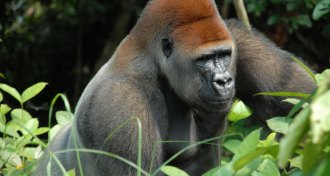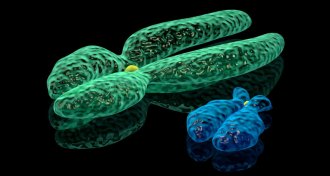
Senior writer Tina Hesman Saey is a geneticist-turned-science writer who covers all things microscopic and a few too big to be viewed under a microscope. She is an honors graduate of the University of Nebraska-Lincoln where she did research on tobacco plants and ethanol-producing bacteria. She spent a year as a Fulbright scholar at the Georg-August University in Göttingen, Germany, studying microbiology and traveling. Her work on how yeast turn on and off one gene earned her a Ph.D. in molecular genetics at Washington University in St. Louis. Tina then rounded out her degree collection with a master’s in science journalism from Boston University. She interned at the Dallas Morning News and Science News before returning to St. Louis to cover biotechnology, genetics and medical science for the St. Louis Post-Dispatch. After a seven year stint as a newspaper reporter, she returned to Science News. Her work has been honored by the National Academies of Sciences, Engineering and Medicine, the Endocrine Society, the Genetics Society of America and by journalism organizations.

Trustworthy journalism comes at a price.
Scientists and journalists share a core belief in questioning, observing and verifying to reach the truth. Science News reports on crucial research and discovery across science disciplines. We need your financial support to make it happen – every contribution makes a difference.
All Stories by Tina Hesman Saey
-
 Health & Medicine
Health & MedicineCells in groups may promote cancer’s spread
Cellular gangs, not individuals, form distant tumors from breast malignancies, a new study finds.
-
 Life
LifeSofter surroundings stifle some chemotherapy drugs
Some anticancer drugs such as Gleevec are less effective when attacking cancer cells grown in soft surroundings.
-
 Earth
EarthMineralogy’s link to ecology makes an Earth twin unlikely
Earth’s unique blend of minerals emerged with the evolution of life, making it extremely unlikely that another planet has Earth’s exact mineral composition.
-
 Archaeology
ArchaeologyMagnetism paved way for excavation without digging
In the 1960s, archaeologists used a new technique to locate and map a submerged Greek city without digging.
-
 Life
LifeTadpole eye transplant shows new way to grow nerves
Wiring replacement organs into the body may be as easy as discharging a biological battery, new experiments with tadpoles suggest.
-
 Life
LifeNorovirus can play protective role in mice
In mice, viral infection can help intestines develop, strengthen immune system.
-
 Neuroscience
NeuroscienceProtein production prevents sleep-loss forgetfulness
Boosting levels of certain proteins in mice prevented memory problems associated with sleep deprivation.
-
 Genetics
GeneticsHuman thoughts control mouse genes
Human brain waves trigger light that activates protein production in rodents.
-
 Genetics
GeneticsGenes tell tale of cat domestication
A peek into cats’ genetic makeup may help reveal how hissing wild felines became purring tabbies.
-
 Life
LifeGut microbes less diverse in humans than in apes
An analysis of gut bacteria shows that humans have evolved to possess less diversity in microbe populations.
-
 Genetics
GeneticsMen who lose Y chromosome have high risk of cancer
Losing the Y chromosome in blood cells may bring on cancer and shorten men’s lives.
-
 Humans
HumansAnglo-Saxons left language, but maybe not genes to modern Britons
Modern Britons may be more closely related to Britain’s indigenous people than they are to the Anglo-Saxons, a new genetic analysis finds.